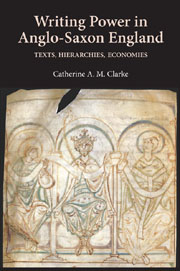Book contents
- Frontmatter
- Contents
- Acknowledgements
- Abbreviations
- Introduction
- 1 Order and Interlace: the Guthlac Poems of the Exeter Book
- 2 Sites of Economy: Power and Reckoning in the Poetic Epitaphs of the Anglo-Saxon Chronicle
- 3 ‘Absens ero … presens ero’: Writing the Absent Patron
- 4 Power and Performance: Authors and Patrons in late Anglo-Saxon Texts
- 5 Remembering Anglo-Saxon Patronage: the Libellus Æthelwoldi Episcopi and its Contexts
- Afterword
- Bibliography
- Index
- ANGLO-SAXON STUDIES
Afterword
Published online by Cambridge University Press: 05 February 2013
- Frontmatter
- Contents
- Acknowledgements
- Abbreviations
- Introduction
- 1 Order and Interlace: the Guthlac Poems of the Exeter Book
- 2 Sites of Economy: Power and Reckoning in the Poetic Epitaphs of the Anglo-Saxon Chronicle
- 3 ‘Absens ero … presens ero’: Writing the Absent Patron
- 4 Power and Performance: Authors and Patrons in late Anglo-Saxon Texts
- 5 Remembering Anglo-Saxon Patronage: the Libellus Æthelwoldi Episcopi and its Contexts
- Afterword
- Bibliography
- Index
- ANGLO-SAXON STUDIES
Summary
This short concluding section will offer some reflections on themes and issues which have emerged across the chapters, and suggestions for ways in which the individual case studies within the book have developed or nuanced our understanding of power as imagined and shaped in late Anglo-Saxon texts. As signalled in the Introduction, the Anglo-Saxon texts explored here present, in their own differing ways, a dual model of power. On the one hand, the sources construct strict systems of hierarchical order and the vertical operation of power, yet they also show individuals to be enmeshed in economies of mutual obligation, interdependence and reciprocity. The doubleness of this way of understanding and representing power often generates tensions and contradictions, as different configurations of relationship and authority overlap, co-exist or shift within texts. Sometimes, the fluidity and ambiguity in representations of relationships suggests a deliberate deflection or evasion of questions of absolute hierarchy, or even the possibility of rhetorical strategies specifically deployed to disguise and euphemise the operation of power. Crucially, these texts also create sites in which authors, patrons and audiences can meet and enact, through particular dynamics of textual production and reception, the exchanges and reciprocities which characterise the broader workings of social and cultural power, authority and obligation.
This study has offered some new possibilities for thinking about the ways in which ideas of power are written into late Anglo-Saxon texts. My focus throughout the chapters has been on representational strategies, the uses of texts to promote particular ideologies or agendas within specific contexts, and their imaginative experimentation with varying configurations of identities, roles and relationships.
- Type
- Chapter
- Information
- Writing Power in Anglo-Saxon EnglandTexts, Hierarchies, Economies, pp. 171 - 174Publisher: Boydell & BrewerPrint publication year: 2012



